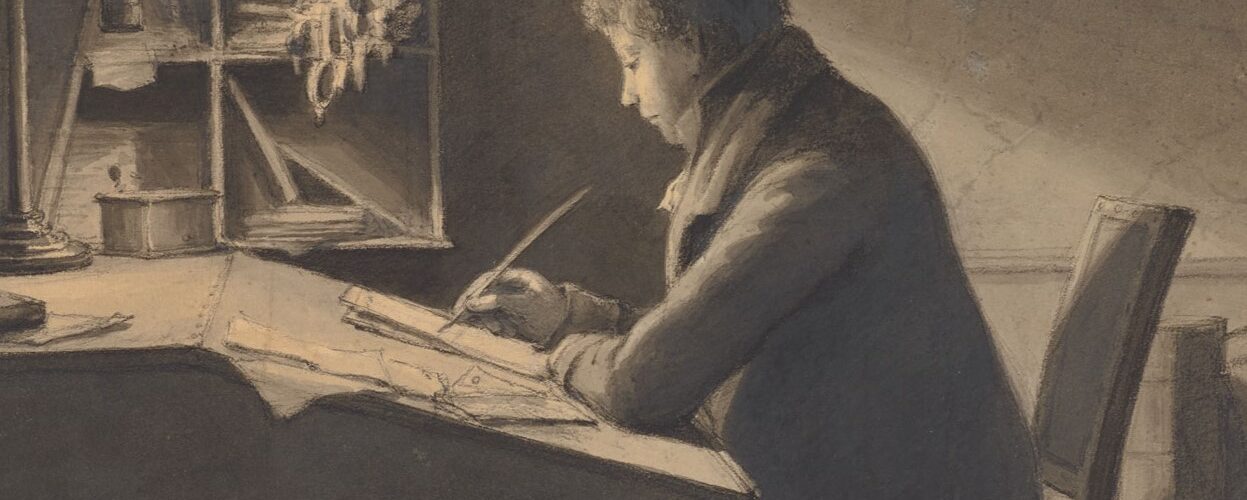My Pennsylvania-born mother owned a black napkin holder sporting an Amish woman and an inscription: “Ve grow too soon alt und too late schmart” (“We grow too soon old and too late smart”).
Recently, I had reason to remember that adage. Because my children have trouble figuring out what to give me for my birthday, this year I figured I’d help them out. Two weeks ahead of the date, I sent them an email describing exactly what I wanted: a copy of Mark Helprin’s latest novel, The Oceans and the Stars; a 132-count supply of a certain type of 12-ounce Dixie cups; or a $25 check for spending in a bookstore.
My daughter thanked me via email then asked, “Could you perhaps come up with some other things to add to this as well?” For the better part of a morning, her question pestered me. Surely a man in my position—I lack the resources to retire, and if some medical misfortune should knock at my door, my bank account would vanish quicker than you could say osteoporosis—should have a long list of wants, but … nothing.
It was then I realized that I’ve reached the age where needs remain in place—an oil change and a tuneup for the car and a knowledgeable tax accountant who charges reasonable rates—and are met by the money I earn, but my wants are few and without consequence.
It was then, too, that an epiphany cuffed me in the head: I am a wealthy man. “There’s no fool like an old fool,” runs the proverb, and I am both old and a fool. Only now have I fully realized what I should have perceived years ago: My riches have little to do with my bank account.
My children are married and successful in life. My grandchildren are healthy, lively, loving, and always entertaining. My siblings are still breathing the air of this planet, and I have three close friends. There’s a roof over my head, food in my refrigerator, hot water for showers, and a day filled from beginning to end with tasks that need doing. For better or for worse, I’ve lived my life as an American, largely making my own decisions without the dictates of government, and now find myself blessed to play a part, however small, in the battle against the homegrown tyrannies of our age and culture.
What more could a man of my years wish for?
For the young, dreams and ambition are everything. I see those young and middle-aged men and women all around me, working, forming and nurturing families, celebrating their victories, and grieving their defeats, pushing with all their might against the weight of the present to create a future. The oils they bring to this canvas of their lives—toil, laughter, tears, dreams—create a painting of beauty and immense power. Their dreams drive the engines of the world.
In “Loveliest of Trees,” A.E. Housman writes of a young person taking time to appreciate the beauty of “the cherry hung with snow.” The narrator of the poem notes,
Now, of my threescore years and ten,
Twenty will not come again,
And take from seventy springs a score,
It only leaves me fifty more.
My own threescore years and ten expired two years ago and will never come again, which means that the time remaining to me is all lagniappe, what the writer Raymond Carver called “pure gravy.” And while I have no bucket list of wishes, my pleasures in this life are many.
One of the greatest of these delights is watching the young people I know. I still dabble with my own brushes and oils, fussing with my self-portrait. But observing the young furiously at work on the canvas of their lives provides an equal, or even greater, joy.
There’s certainly enough in the world to complain about, but finding that joy—whether we are building our lives or watching others do so—is a more challenging, and worthy, pursuit.
And so, I suppose I do have one birthday wish, but it’s aimed at my children and their contemporaries. Keep on painting, never give up, and no matter what your sins or mistakes—and I have committed both—strive to become better artists of your lives.
The paintings you are crafting are your best gifts to me, sources of hope and works of profound beauty.
—
Image credit: Public domain


















